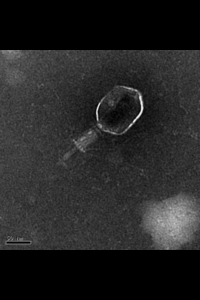Twelve BYU students and their advisors will spend this weekend in Boston participating in the International Genetically Engineered Machine (iGEM) world competition at MIT after being chosen to advance with the top teams from North America. Since March, the team of 12 has been preparing, coming up with ideas and working toward solving a world problem through synthetic biology.
The problem the BYU iGEM team is trying to solve is a problem that affects millions each year through contaminated water sources: cholera.
“We wanted to come up with a detection system for cholera that people could use in a developing country because that is where the problem really is,” said BYU microbiology student Clarise Harrison.

Harrison said the team’s bacteriophage, a virus that infects bacteria, would lock on to E. coli cells in water. This phage would then release an agent genetically programmed to degrade cholera biofilm, a necessity for cholera to survive in water and give a visible sign when cholera is detected.
Julianne Grose, BYU assistant professor of microbiology and molecular biology, said the students started in March, working about six to 10 hours a week on the project. As the competitions have gotten closer, that time has moved upwards of 20 hours per week.
Grose, a team advisor, said, “For this presentation they have to do an oral presentation, 20 minutes in front of judges.” She continued, “They have to do their wikis, their website, and they have to do a poster presentation. It has been a lot of work.”
Arick Christopher, a team member and BYU exercise science major, can testify of that. He works 20 hours a week as a teaching assistant on campus on top of his other classes and hours put in for the competition.
“It’s the end result that is the exciting part. It is these ideas that will be affecting our world for the better,” Christopher said. “It is that sort of thing that fuels your desire to go through the long hours of lab-work.”
Grose said some iGEM teams spend 60 hours a week for six months. Despite some teams spending more time, Grose says the BYU iGEM team is in the competition. BYU was one of 22 teams from North America chosen to advance to the world iGEM competition this weekend.




